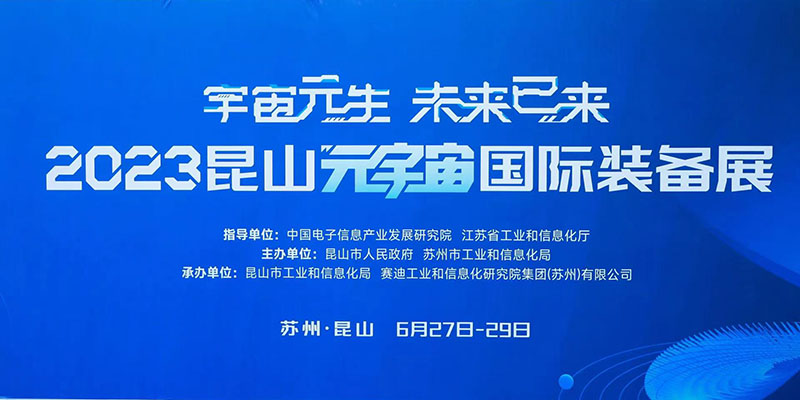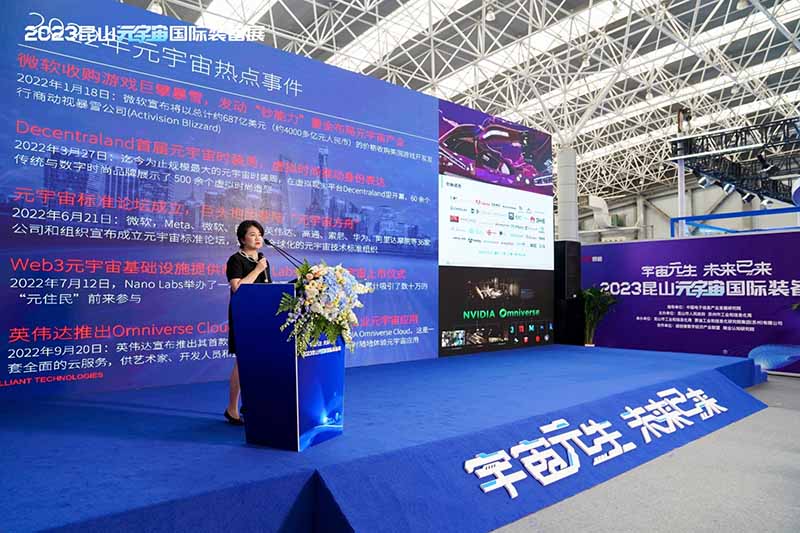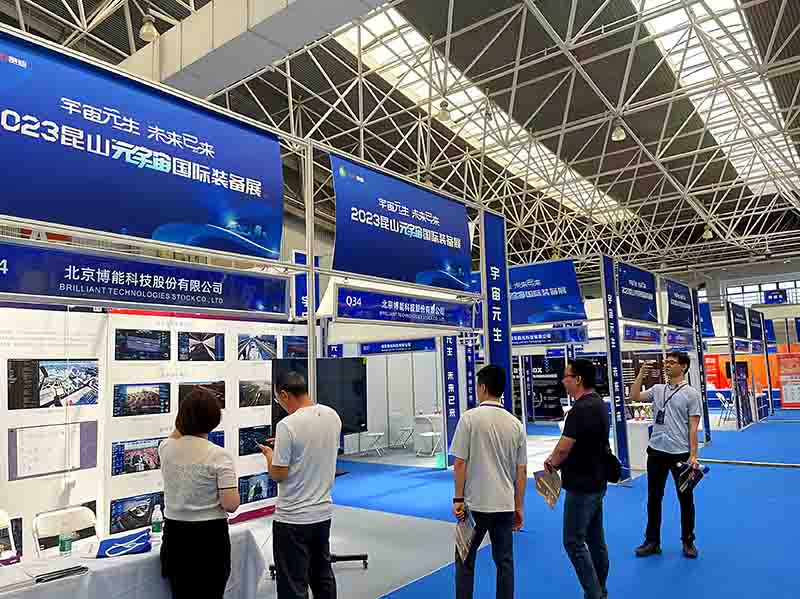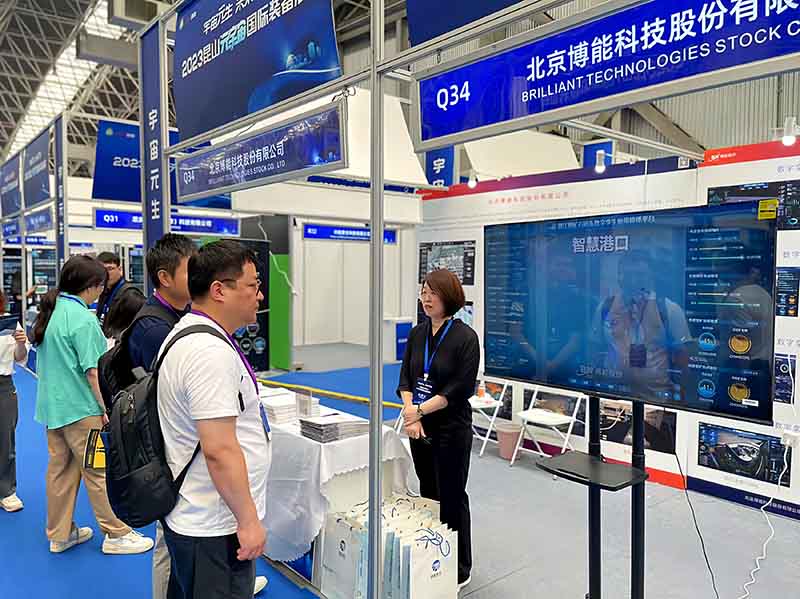
Brilliant News
Publish Time:2024-12-27

The "2023 Kunshan Metaverse International Equipment Exhibition" was successfully held in Kunshan from June 27th to 29th, 2023. With the theme "Metaverse Born of the Cosmos, the Future is Now," the event was guided by the China Academy of Information and Communications Technology and the Department of Industry and Information Technology of Jiangsu Province. It was hosted by the People's Government of Kunshan and the Suzhou Municipal Bureau of Industry and Information Technology, and organized by the Kunshan Municipal Bureau of Industry and Information Technology and the CCID Industrial and Information Technology Research Institute Group (Suzhou) Co., Ltd. The exhibition gathered over 120 leading domestic and international metaverse companies, becoming a professional event with national influence. The categories of exhibits covered a wide range of fields, including artificial intelligence, cloud computing, big data, blockchain, display devices, sensors, 3D modeling, and rendering engines.
Brilliant Co., Ltd. was invited to attend the conference, and Han Jingting, Vice President and General Manager of the Operations Center of Beijing Brilliant Technology Co., Ltd., was invited to deliver a keynote speech titled "The 'Two-Way Rush' of Digital Twins and the Metaverse."

From the perspective of the metaverse industry's financing, in 2022, the global metaverse industry saw a total of 704 financing deals, with a total amount reaching 86.867 billion yuan. Among these, China (including Hong Kong, Macao, and Taiwan) completed 125 deals, with a total financing amount of 12.782 billion yuan, giving birth to 4 industry unicorns. Looking at the sub-tracks, the metaverse industry applications, underlying technologies, gaming, social, media and communities, and digital humans are the most sought after by capital.
In terms of domestic metaverse industry policies, several cities across the country have introduced metaverse support policies, including Shanghai, Beijing, Guangzhou, Hangzhou, Nanjing, Xiamen, Shenzhen, Wuhan, Baoding, Chengdu, Haikou, Hefei, Nanchang, Shenyang, Wuxi, Chongqing, all of which have mentioned the metaverse or introduced special metaverse plans, indicating the high importance placed on the metaverse by various regions, striving to seize the initiative in the metaverse.
The development of the metaverse industry chain is inseparable from the support of various technologies, which can be roughly divided into seven levels: the experience layer, discovery layer, creator economy layer, spatial computing layer, decentralization layer, human-computer interaction layer, and infrastructure layer.
The commonality between the metaverse and digital twins is that both are based on digital technology to recreate highly realistic digital objects and events for visual perception interaction and operation, with underlying support technologies that can be Universal
The difference is that the metaverse can use the real physical world as a digital framework or completely shape a new conceptual digital world. Its ultimate form is a native society based on the digital world, where each resident has a unique, independent digital identity and digital perception body, and can socialize online and continue social construction, characterized by concept and imagination. Digital twins, on the other hand, strictly and precisely map the physical world and event processes in the information world as the framework and foundation. Whether it is industrial manufacturing or city management, it is based on real-time objective data dynamics, combined with artificial intelligence for mining analysis and deep learning, and further simulates situations and decision-making to improve reality or better adapt to reality, ultimately achieving autonomous control or autonomous decision-making control, with the ultimate form being autonomous twins.
The essential difference is that one is the integration of the virtual and the real in the virtual world, and the other is the cloning of reality.
In terms of application capabilities, digital twins can mirror physical entities into virtual space, creating a "digital twin" that reflects the entire lifecycle process of the corresponding physical entity. This enables the display, monitoring, alarm, simulation, and optimization decision-making of the physical world and can be widely applied to fields such as smart civil aviation, smart transportation, smart power, and smart ports.
As a leader in digital twin technology services, Brilliant Co., Ltd. has adhered to independent innovation since its establishment in 2005 and was approved as a national specialized and innovative "Little Giant" enterprise in 2022. In the field of airports, Brilliant has created benchmark cases of digital twin airport projects such as Beijing Daxing International Airport, Beijing Capital International Airport, Chengdu Tianfu International Airport, and Ezhou Huahu Airport. These projects cover capabilities such as integrated air and ground operation twin monitoring, digital control towers, virtual inspection systems, emergency simulation drills, and command and dispatch, which can empower the entire lifecycle of Type 4 airports, from planning, design, construction, and operation to maintenance, with the entire lifecycle-related data, processes, and businesses supported by it. In the field of highways, Boneng has implemented the Taihu Tunnel Digital Twin Visualization project, providing capabilities including integrated road and tunnel twin display, vehicle twins, traffic flow analysis, environmental monitoring, and event simulation. It has transformed from a single method of video monitoring for operation and management to comprehensive operation and supervision under the twin platform, which includes the operational status of various facilities and equipment, real-time traffic conditions, and prediction and simulation of various events, greatly enhancing the level of highway operation and management, achieving visibility, manageability, and controllability. In the field of water conservancy, Boneng has built a digital twin lock scheduling system based on the digital twin operating system BLinkOS, combining lock operation scheduling with visualization. By integrating BIM and GIS, a three-dimensional visualization model is constructed to achieve real-time monitoring and visual presentation of lock operation scheduling, allowing for a more intuitive view of alarms and issues during the ship scheduling process. It automatically checks for violations in ship operations during the lock passage through safety monitoring and image analysis. Based on the characteristics of ships passing through the lock, lock operation, and navigation scheduling, it optimizes ship scheduling sorting to ensure the safety and flexibility of the system.
Currently, Brilliant has implemented digital twin projects in multiple fields such as smart cities, smart parks, and smart power. In the future, Boneng will apply digital twin capabilities to more fields.
As the underlying support technology for building the metaverse, digital twins play a crucial role. Brilliant is committed to working with industry partners to jointly create a smarter, more sustainable, and shared metaverse world, bringing more opportunities and possibilities.
At this conference, Brilliant Co., Ltd. also showcased its independently developed digital twin operating system BLinkOS and digital twin solutions targeting various fields, which attracted many guests to stop by, communicate, and visit.

